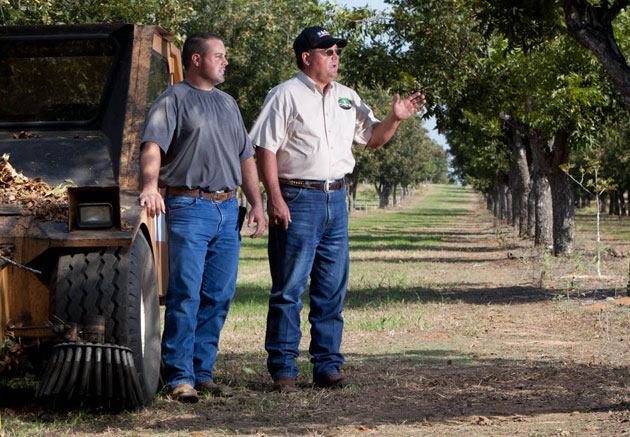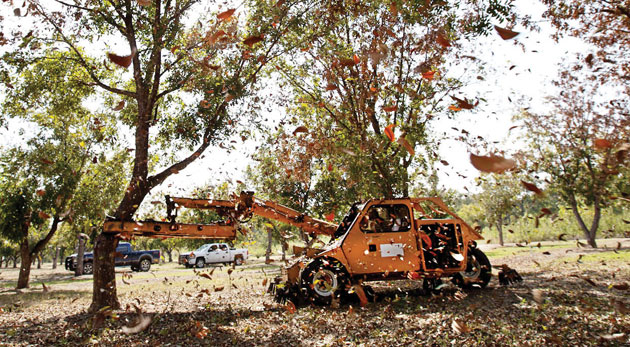
Gayland and Kinley Sorrells
Photos by Jim Lincoln
On a hot August day this past summer, Kinley Sorrells and his son, Gayland, stood amid acres of pecan trees on their central Texas farm. Surveying the results of a “pre-harvest shaking,” which thins the trees, allowing what’s left to flourish, Gayland questioned the number of pecans scattered at their feet.
“Dad, there’s too many of them. I think we shook too many,” Gayland told his father.
With the wisdom that comes from farming pecans for 35 years, Kinley simply responded: “Don’t look on the ground; look at what is still left in the trees.”
It’s this experience and perspective that has allowed Sorrells Farms, a diversified farming and ranching operation in Comanche County, Texas, to be successful. With more than 1,200 acres of sandy farmland, the farm primarily produces pecans, cantaloupes, watermelons and peaches, and also grows a handful of other kinds of produce.
According to Kinley, it is in harvest mode 10 months of the year.
Pruning Trees, but Not Profits
“I wouldn’t say Comanche County is a farmer’s paradise, but we can grow a lot of crops that you can’t in the Texas Hill Country,” Kinley says of the comparison between the area where he lives now and the area where he grew up farming.
After graduating from college, Kinley decided not to return to the Hill Country, and took a job with the state Extension service. He later became manager of a large commercial pecan operation, and in 1986, purchased his first orchard. Today, Sorrells Farms, operated by father and son, has pecan trees on 800 contiguous acres.
While Georgia is the top pecan-producing state in the U.S. most years, Texas is second (but occasionally first) and on average produces about 60 million pounds annually. Kinley says that orchards in his area are capable of producing 1,200 pounds per acre and, after the lingering drought of recent years, the 2012 crop is expected to be a strong one.
A healthy crop is commonplace for Sorrells Farms, where Kinley and Gayland use a number of best management practices. Years ago, after seeing a decline in the size of pecans their trees were producing, Kinley deduced that the trees had grown so much that they were overcrowded. Fearing it was affecting nut quality, he made the decision to remove half of the trees from the orchard.
“It was a hard thing to do, but we knew it had to be done,” he says. “It got to a point where we were spinning our wheels quality- and size-wise, but once we thinned the trees, it made a world of difference.
“Your first thought is, ‘I’m cutting my production in half,’ but it really doesn’t work that way. If it takes two pecans to weigh what one good-quality pecan weighs, you’re better off just having the one,” Kinley says.
To supplement average annual rainfall of 28 to 32 inches, the farm has a drip irrigation system buried underground that moves water directly to the trees’ roots, a practice that boosts production.

Shaking the trees for harvest, which begins in late September and runs through February
In Grocery Stores From China to Texas
After leaving the farm, Sorrells Farms pecans could end up in a number of places — even as far away as China. Kinley explains that the Chinese middle class has developed a taste for pecans, and as this class grows, so does its demand for pecans.
He has been exporting nuts for 11 years, and these days, seldom does a week go by during the season that he doesn’t receive an e-mail from a broker for China.
“It does put a little stress on the U.S. market because the Chinese want the biggest pecans possible, and if all of the bigger pecans go to China, there’s not any for our shellers here. Of course, it all depends on the price,” he says. “We don’t like to exclude our state shellers, because we never know what’s going to happen overseas.”
Most of the farm’s pecan crop does stay in the U.S., and the Sorrells sell a majority of it, along with most of their cantaloupes and watermelons, through wholesale grocery chains.
One such chain is United Supermarkets, which has stores in 30 markets across north and west Texas. Kinley has done business with United for more than 20 years, and his family was even included in a print campaign that introduced store customers to the farmers producing their food. In addition, once a year, he spends a day at a store in the Dallas–Fort Worth area, greeting shoppers and handing out samples of watermelons from his farm.
“It’s a good deal because we’ll just about sell out a bin of watermelons by the time I leave. People are interested, and they like it if they can put a face on that farmer who’s saying, ‘I grew that watermelon, taste it,’” he says.
Experience Benefits Others
For the past six years, Kinley has put his farming expertise and experience to use in another place far from the fields — a board room. In 2006 he was elected to the AgTexas Board of Directors, and is currently serving his third term on the board.
Having enjoyed witnessing and being a part of the cooperative lender’s growth over the years, he acknowledges that a lot goes into serving on the board. “It takes time as a director — if you are going to contribute, there is effort and energy that goes into it, and I appreciate the opportunity to serve,” Kinley says.
Kinley is also quick to credit management for their foresight, which has resulted in a strong, sound co-op.
“If a farmer or rancher is about to face something financially detrimental, AgTexas is not one to just kick them to the side of the road,” he says. “They begin to work with that customer and help them try to straighten things out.”
Similar to the co-op Kinley serves, Sorrells Farms is a profitable operation because of solid management skills and a deep understanding and love of agriculture.
“I’m a farmer,” Kinley states.
“It’s in my blood.”
-Staff
A Taste of the Farm — Off the Farm
Delinda Sorrells, second from left, and her staff sell Sorrells Farms products at their retail business in Comanche.
While most of the pecans and produce from Sorrells Farms is marketed through retail grocery chains, the family also runs their own retail business offering their homegrown wares. The store was located at the farm, but relocated a few miles away to a renovated house in Comanche in October of 2011.
In the new space, the family cooks up and offers a variety of homemade pecan products, such as candies, pies, cookies, breads and more — all made using Sorrells Farms pecans — which are also available for sale online.
A produce shed houses fresh seasonal produce grown on the farm, including zucchini, jalapeños, habanero peppers, cucumbers, onions and tomatoes, in addition to several varieties of juicy cantaloupe and watermelon. A garden center in the backyard offers an abundance of choices, as well.
Kinley’s wife, Delinda, also wanted the store
to be a place where people in their small town could buy a baby or bridal shower gift, so they expanded to offer gift and jewelry items.
“It’s obviously evolved into much more than pecan products,” Kinley says with a laugh. To order products online, visit sorrellsfarms.com.